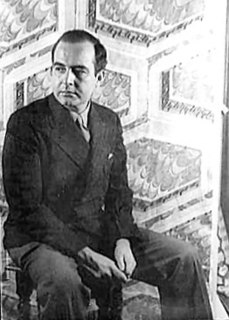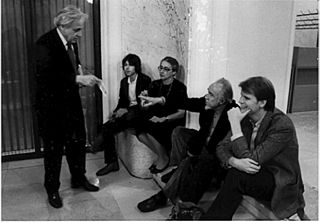Related Research Articles

Aaron Copland was an American composer, composition teacher, writer, and later a conductor of his own and other American music. Copland was referred to by his peers and critics as "the Dean of American Composers". The open, slowly changing harmonies in much of his music are typical of what many people consider to be the sound of American music, evoking the vast American landscape and pioneer spirit. He is best known for the works he wrote in the 1930s and 1940s in a deliberately accessible style often referred to as "populist" and which the composer labeled his "vernacular" style. Works in this vein include the ballets Appalachian Spring, Billy the Kid and Rodeo, his Fanfare for the Common Man and Third Symphony. In addition to his ballets and orchestral works, he produced music in many other genres, including chamber music, vocal works, opera and film scores.

Samuel Osmond Barber II was an American composer, pianist, conductor, baritone, and music educator. One of the most celebrated composers of the 20th century; music critic Donal Henahan stated, "Probably no other American composer has ever enjoyed such early, such persistent and such long-lasting acclaim." Principally influenced by nine years of composition studies with Rosario Scalero at the Curtis Institute and more than twenty-five years of study with his uncle, the composer Sidney Homer, Barber's music usually eschewed the experimental trends of musical modernism in favor of utilizing traditional 19th-century harmonic language and formal structure that embraced lyricism and emotional expression. However, elements of modernism were adopted by Barber after 1940 in a limited number of his compositions, such as an increased use of dissonance and chromaticism in the Cello Concerto (1945) and Medea's Dance of Vengeance (1955), and the use of tonal ambiguity and a narrow use of serialism in his Piano Sonata (1949), Prayers of Kierkegaard (1954), and Nocturne (1959).

Serge Alexandrovich Koussevitzky was a Russian-born conductor, composer and double-bassist, known for his long tenure as music director of the Boston Symphony Orchestra from 1924 to 1949.

Michael Kevin Daugherty is an American composer, pianist, and teacher. He is influenced by popular culture, Romanticism, and Postmodernism. Daugherty's notable works include his Superman comic book-inspired Metropolis Symphony for Orchestra (1988–93), Dead Elvis for Solo Bassoon and Chamber Ensemble (1993), Jackie O (1997), Niagara Falls for Symphonic Band (1997), UFO for Solo Percussion and Orchestra (1999) and for Symphonic Band (2000), Bells for Stokowski from Philadelphia Stories for Orchestra (2001) and for Symphonic Band (2002), Fire and Blood for Solo Violin and Orchestra (2003) inspired by Diego Rivera and Frida Kahlo, Time Machine for Three Conductors and Orchestra (2003), Ghost Ranch for Orchestra (2005), Deus ex Machina for Piano and Orchestra (2007), Labyrinth of Love for Soprano and Chamber Winds (2012), American Gothic for Orchestra (2013), and Tales of Hemingway for Cello and Orchestra (2015). Daugherty has been described by The Times (London) as "a master icon maker" with a "maverick imagination, fearless structural sense and meticulous ear."
Samuel Hans Adler is an American composer, conductor, author, and professor. During the course of a professional career which ranges over six decades he has served as a faculty member at both the University of Rochester's Eastman School of Music and the Juilliard School. In addition, he is credited with founding and conducting the Seventh Army Symphony Orchestra which participated in the cultural diplomacy initiatives of the United States in Germany and throughout Europe in the aftermath of World War II. Adler's musical catalogue includes over 400 published compositions. He has been honored with several awards including Germany's Order of Merit – Officer's Cross.

Connotations is a classical music composition for symphony orchestra written by American composer Aaron Copland. Commissioned by Leonard Bernstein in 1962 to commemorate the opening of Philharmonic Hall in New York City, United States, this piece marks a departure from Copland's populist period, which began with El Salón México in 1936 and includes the works he is most famous for such as Appalachian Spring, Lincoln Portrait and Rodeo. It represents a return to a more dissonant style of composition in which Copland wrote from the end of his studies with French pedagogue Nadia Boulanger and return from Europe in 1924 until the Great Depression. It was also Copland's first dodecaphonic work for orchestra, a style he had disparaged until he heard the music of French composer Pierre Boulez and adapted the method for himself in his Piano Quartet of 1950. While the composer had produced other orchestral works contemporary to Connotations, it was his first purely symphonic work since his Third Symphony, written in 1947.
Claire Raphael Reis was a music promoter and the founder of the People's Music League in New York City. The League was intended to provide free concerts for immigrants and public schools.

Julius Hegyi was an American conductor and violinist.
Capricorn Concerto, Op. 21, is a composition for flute, oboe, trumpet and strings by Samuel Barber, completed on September 8, 1944. A typical performance lasts approximately 14 minutes.

The International Society for Contemporary Music (ISCM) is a music organization that promotes contemporary classical music.
Frank J. Oteri is a New York City-based composer, a music journalist, lecturer, and new music advocate
Julia Frances Smith was an American composer, pianist, and author on musicology.
NewMusicSA is the South African section of the International Society for Contemporary Music (ISCM). Its formation on 10 May 1999 heralded the return of South African representation at the ISCM after many decades.
Chan Wing-wah (JP is a Chinese conductor and composer. He is professor of music at the Chinese University of Hong Kong and president of the Composers and Authors Society of Hong Kong. He was also chairman of the Hong Kong Composers' Guild, vice president of the Asian Composers' League and board member of the International Society for Contemporary Music. He composed over 100 works, including eight symphonies. He was awarded several times, e.g. with the ACL Yoshiro Irino Memorial Prize, the Ten Outstanding Young Persons Award and the composition award of the International Double Reed Society in Florida.
String Quartet No. 1 by Walter Piston is a chamber-music work composed in 1933.
Carol J. Oja is a musicologist and scholar of American Studies. Since 2003, she has held the post of William Powell Mason Professor at Harvard University. She has served as the Leonard Bernstein Scholar-n-Residence with the New York Philharmonic. Her previous appointments have been at the College of William and Mary (1997–2003) and the City University of New York (1988–97), where she was professor of music at Brooklyn College and the Graduate Center, as well as director of the Institute for Studies in American Music (1993–97). She attended St. Olaf College (B.A.), the University of Iowa (M.A.), and the Graduate School of the City University of New York (Ph.D.).
Robert Moffat (variously "Moffatt" and "Moffett") Palmer was an American composer, pianist and educator. He composed more than 90 works, including two symphonies, Nabuchodonosor, a piano concerto, four string quartets, three piano sonatas and numerous works for chamber ensembles.
The 1931 International Society for Contemporary Music Festival was the ninth edition of the society's annual festival. It was held in London and Oxford from 23 to 28 July 1931 and consisted of six concerts featuring 29 compositions from thirteen countries, including one opera. Eleven works were broadcast by the BBC, bringing the festival to national attention.

John Kirkpatrick was an American classical pianist and music scholar, best known for championing the works of Charles Ives, Aaron Copland, Carl Ruggles, and Roy Harris. He gave the first complete public performance of Ives's Concord Sonata in 1939, which became a turning point in the composer's public recognition. At the time of his death Kirkpatrick was a professor emeritus at Yale University, where he had also been the curator of the Charles Ives archives.
Samuel Krachmalnick was an American conductor and music educator. He first came to prominence as a conductor on Broadway during the 1950s, notably earning a Tony Award nomination for his work as the music director of the original production of Leonard Bernstein's Candide. He went on to work as a busy conductor of operas and symphony orchestras internationally during the 1960s and 1970s. He was particularly active in New York City, where he held conducting posts with the American Ballet Theatre, the Harkness Ballet, the Metropolitan Opera, and the New York City Opera. His later career was primarily devoted to teaching on the music faculties of the University of Washington and the University of California, Los Angeles.
References
- ↑ Metzer, David (1997). "The League of Composers: The Initial Years". American Music. 15 (1 (Spring, 1997)): 45–69. doi:10.2307/3052697. JSTOR 3052697.